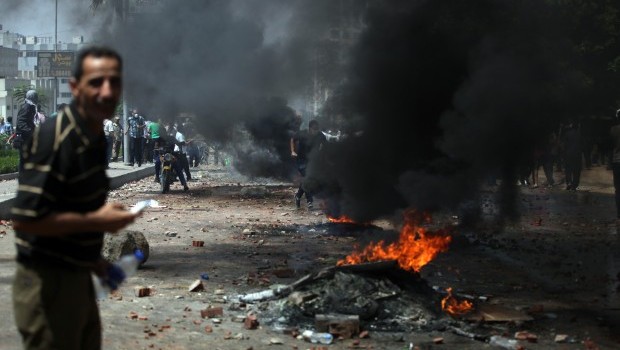
Supporters of Egypt’s ousted president, Mohamed Mursi, clash with the Egyptian security forces as they clear a sit-in by supporters of ousted Islamist president Mohamed Mursi in the eastern Nasr City district of Cairo, Egypt, on Wednesday, August 14, 2013. (AP Photo/Khalil Hamra)
London, Asharq Al-Awsat—The Egyptian government declared a state of emergency on Wednesday, after bloody clashes between protesters and security forces left hundreds dead.
The declaration, issued in the name of office of Egypt’s interim president, Adly Mansour, said that the state of emergency—declared at 2 p.m. GMT—would last for a month.
The declaration followed the deaths of at least 421 civilians in street battles in Cairo on Wednesday, according to the latest figures from the Egyptian ministry of health.
The interior ministry confirmed that 43 members of the security forces had also been killed as they attempted to clear demonstrators from Al-Nahda Square and outside the Rabaa Al-Adawiya mosque in the city, which they had been occupying for six weeks.
The protesters were demanding the restoration of the Muslim Brotherhood-backed president Mohamed Mursi, who remains in detention.
Journalists on the scene reported hearing intense gunfire and heavy use of teargas.
In addition to violence in Cairo, there were reports of violence in other cities, including Alexandria, Suez and Assyut.
The majority of the casualties are reported to be civilian demonstrators.
The declaration is likely to raise fears in the country and internationally that Egypt is moving closer to outright military rule. The three-decade rule of ousted dictator Hosni Mubarak, who was toppled at the beginning of 2011, relied on the use of “emergency powers,” which were originally put in place in 1981 and periodically renewed.
Western governments on Wednesday called on all sides in Egypt to exercise restraint and avoid violence following the clashes in Cairo.
The UN Secretary-General Ban Ki-moon released a statement condemning the violence. According to his spokesman, “it appears that hundreds of people were killed or wounded in clashes between security forces and demonstrators. . . . The Secretary-General regrets that Egyptian authorities chose instead to use force to respond to the ongoing demonstrations.”
The EU also called on Egyptian security forces to exercise restraint following news of the deaths in Cairo. The EU’s foreign policy chief, Catherine Ashton, released a statement that said: “I call on the security forces to exercise utmost restraint and on all Egyptian citizens to avoid further provocations and escalation.”
In the UK, Foreign Secretary William Hague issued a statement expressing concern and regret for the loss of life. He said: “I am deeply concerned at the escalating violence and unrest in Egypt, and regret the loss of life on all sides. The UK has been closely involved in intensive diplomatic efforts directed at reaching a peaceful resolution to the standoff. I am disappointed that compromise has not been possible. I condemn the use of force in clearing protests and call on the security forces to act with restraint. Leaders on all sides must work to reduce the risk of further violence. Only then will it be possible to take vital steps towards dialogue and reconciliation.”
British Foreign Office Minister Alistair Burt gave his reaction this morning via social media, tweeting “#Egypt: Deeply concerned at events continuing today in #Cairo leading to deaths and injury. Restraint and dialogue more urgent than ever.”
German foreign minister Guido Westerwelle called on the Egyptian government to “allow peaceful protests.” Westerwelle said “Berlin had conveyed this clear expectation to the Egyptian side directly.” He also urged the protesters to “distance themselves from violence.”
The French Foreign Ministry said it “deplored” the violence and issued a statement in which it said: “It is essential that this violence stops and that a logic of easing of tensions prevails. France calls on the parties to show proof of the greatest restraint and warns against the disproportionate use of force.”
Meanwhile, Turkish prime minister Recep Tayyip Erdoğan was quoted by Reuters as saying “armed intervention against civilians in Egypt is ‘completely unacceptable.” He issued a statement which said: “The international community, especially the U.N. Security Council and Arab League, must act immediately to stop this massacre.”
Turkey’s main opposition party, the Republican People’s Party (CHP), also condemned the Egyptian security forces’ crackdown against pro-Mursi protesters. Faruk Loğoğlu, the deputy chairman of the CHP, said: “We are very sad and concerned about these developments.”
The US government, which currently supplies over USD 1 billion in military aid to Egypt every year, delivered similar statements later on Wednesday.
Describing the situation as “deplorable,” Secretary of State John Kerry stated that both sides “share a responsibility to avoid violence,” and that the use of force “is simply not a solution in Egypt or anywhere else. Violence will not create a roadmap for Egypt’s future.”
Referring to the January 25 revolution that prompted the ouster of former president Hosni Mubarak, Kerry said: “The promise of the 2011 revolution has simply never been fully realized, and the final outcome of that revolution is not yet decided. It will be shaped in the hours ahead, in the days ahead.”
This article was originally published on August 14, 2013, and has been updated to reflect further developments.

But are they restraining their drones in Yemen? or would they restrain themselves if they had to face this mess in their own countries?? could we say, double standard???